Katz in Brief: Massacre at Moscow’s Crocus City Hall Fitting to ISKP's Calls to Attack Concerts, Other Targets
By Rita Katz | Published 03.26.2024
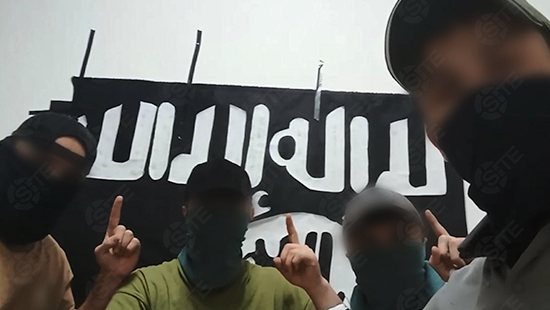
The perpetrators of the Crocus City Hall terrorist attack
The following is the latest in a series of briefings from Rita Katz, Executive Director of the SITE Intelligence Group. The series draws on SITE research to give flash commentary, explainers, and analyses on matters spanning jihadists to the far right.
Following US government warnings weeks earlier of a pending terrorist attack in Moscow, four armed men entered the area’s Crocus City Hall on Friday evening and killed at least 137 people. The Islamic State (IS/ISIS) took credit soon after, a claim the US government confirmed while pointing more specifically to the group’s Khorasan Province (ISKP/ISIS-K).
It marked yet another ISIS attack targeting a concert venue, adding to past massacres like those at Paris’ Bataclan theatre in 2015 and Manchester Arena in 2017. It also comes after ISKP media groups’ repeated threats for attacks—including “music events”—against several singled-out Western countries, as detailed below.
Yet ISKP’s role in the attack isn’t just unsurprising. It is telling of how this Afghanistan-born ISIS “province” is shaping the group’s threat—both in Central Asia and across the world.
ISIS Claims the Attack
ISIS' global support rests in no small part on its image as a capable organization, and this devastating massacre in Russia will only feed into that image.
ISIS first claimed the attack via a report from its ‘Amaq News Agency. Citing a “security source,” the ‘Amaq report stated, “Islamic State fighters attacked a large gathering of Christians in the city of Krasnogorsk…killing and wounding hundreds and causing great destruction to the place before they withdrew to their positions safely.”
The following day, ISIS released another ‘Amaq report, providing a photo of the four attackers. The report claimed they “were armed with machine guns, a pistol, knives, and incendiary devices, and was preceded by an intensive surveillance operation of the place.”
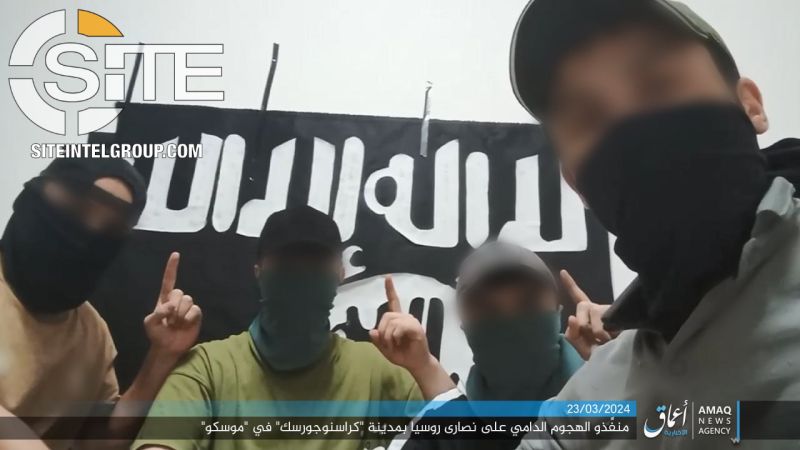
Photo released by ISIS on March 23, 2024
The group finally issued a formal communique for the attack the same day, largely restating information included in the prior communications and once more describing the targeted victims as “a large gathering of Christians.”
'Amaq also released a disturbing video containing graphic footage of the attack, filmed by the attackers themselves.
ISIS-K’s Responsibility Makes Sense
Though none of ISIS’ statements directly attributed its massacre to ISKP, there is little reason to doubt its responsibility.
US intelligence has pointed to ISKP as responsible for the attack, which is demonstrably credible given the accuracy of its prior warnings. Specifically, on March 7, the US Embassy in Russia warned that “extremists have imminent plans to target large gatherings in Moscow, to include concerts.”
It was only three months before the Crocus City Hall attack that ISIS pulled off its January bombings in Iran. Both were by far the largest operations of their kind that the group has claimed in years.
Weeks later, in the aftermath of the attack, one US official stated, “We have basically a steady stream of intelligence dating back to November about ISIS wanting to strike within Russia.”
And while ISIS didn’t directly attribute the Russia attack to ISKP, it would not be the first time ISIS declined to do so for such a major operation. Claiming its deadly bombings this past January at the Qasem Soleimani memorial in Iran, ISIS’ communique likewise did not cite ISKP, despite the mountain of clear evidence it was behind the atrocity. The statement was instead labeled as “Iran,” just as that for Moscow was labeled “Russia.”
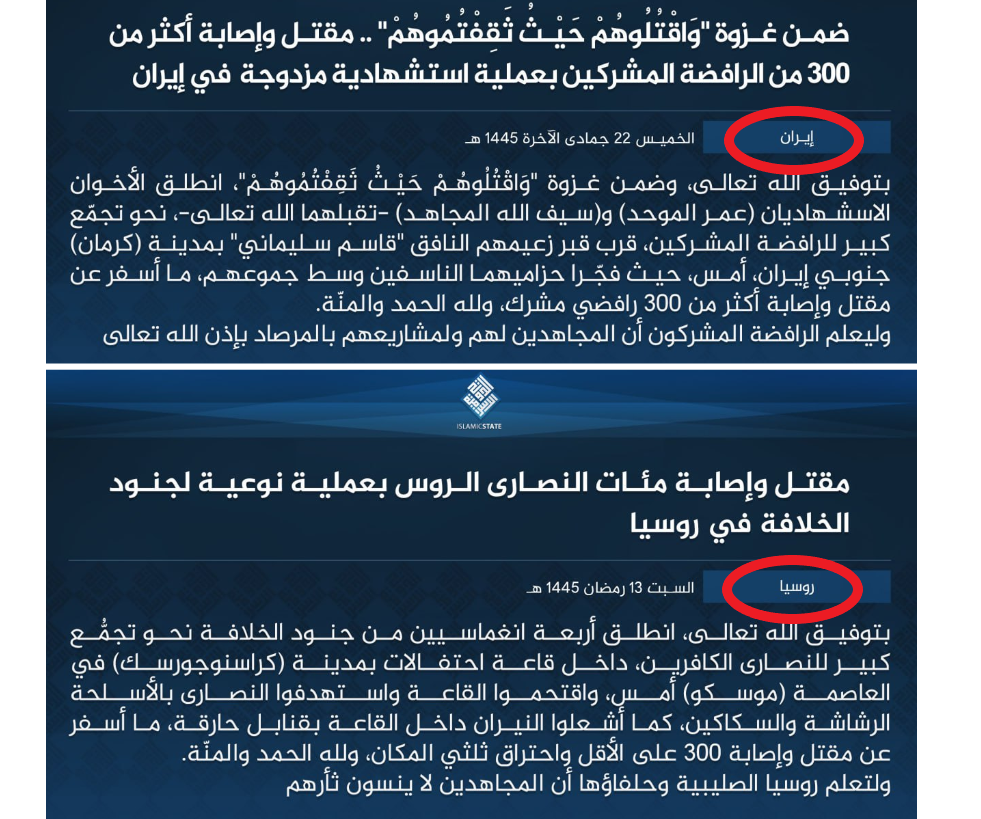
ISIS’ attack claim communiques for the January Kerman, Iran attack, with location labeled "Iran" (top); and the Crocus City Hall attack, with location labeled "Russia" (bottom)
ISKP’s role also makes sense when recognizing ISKP’s role as ISIS’ main “province” for external operations. Though the Taliban took out much of ISIS’ leadership in Afghanistan in recent years, ISIS-K adapted by spreading itself out across terrorist cells, media operatives, and other entities who can communicate in Tajik, Uzbek, Farsi, and other languages. Today, ISKP’s tentacles reach across Central Asia—including regions formerly under the Soviet Union—allowing it to strike inside neighboring countries like Russia and Iran.
Finally, one can look to the deluge of terrorist threats ISKP has itself issued in the last year alone via Al-Azaim Media Foundation, its de-facto media arm. Azaim content, which SITE regularly reports on, spans Farsi, Uzbek, Tajik, English, Pashto, and other languages. Its productions capitalize on world events to demand attacks in the US, UK, Sweden, Canada, France, Netherlands, Germany, and elsewhere.
Some of Azaim's threats are chillingly relevant to ISKP's attack in Russia. One production from December even gave an infographic detailing “places where the Jews can be targeted easily,” listing “music events” as one option alongside “popular tourist sites” and "universities, colleges, and schools.”
These messages fit with ISKP’s unhinged pursuit for carnage across the West. Other Azaim content has likewise instructed to "kill [non-Muslims] like dogs" after Quran-burning stunts and glorified past ISIS attacks in the West. A February 2023 production even listed targets for carrying out “a strike that will tear out [Westerners'] hearts.” Among the targets suggested were police, markets, malls, sporting events, and, once more fitting with the attack in Russia, “music concerts.”
Likely Ripple Effects from the Russia Attack
The immediate implications of ISKP’s Russia attack speak for themselves: an ISIS “province” has proven its ability to carry out mass-casualty external operations out of Central Asia, all despite the Taliban’s relentless crackdowns and Russia and Iran’s pervasive security apparatuses.
Yet there is also danger in the message ISIS is sending to its followers and the rest of the world: that it remains a relevant threat. ISIS' global support rests in no small part on its image as a capable organization, and this devastating massacre in Russia will only feed into that image.
Immediately after the attack, ISIS-linked media groups began a celebration campaign dubbed, “The Moscow Invasion,” creating posters and urging supporters around the world to carry out similar attacks.
“Today...Today is the Day of Retribution,” one poster read, showing ISIS’ picture of the four attackers. “The Fiercest Attack in Years... A Bloody Attack by the Islamic State in the Heart of Russia.”
Another exclaimed, “[The attackers] warmed the hearts of the believers and filled with rage the hearts of the disbelievers and sedition sowers.”
Others declared, “Blood for blood, destruction for destruction,” and “We will continue to fight you and make your lives miserable as long as we live…”
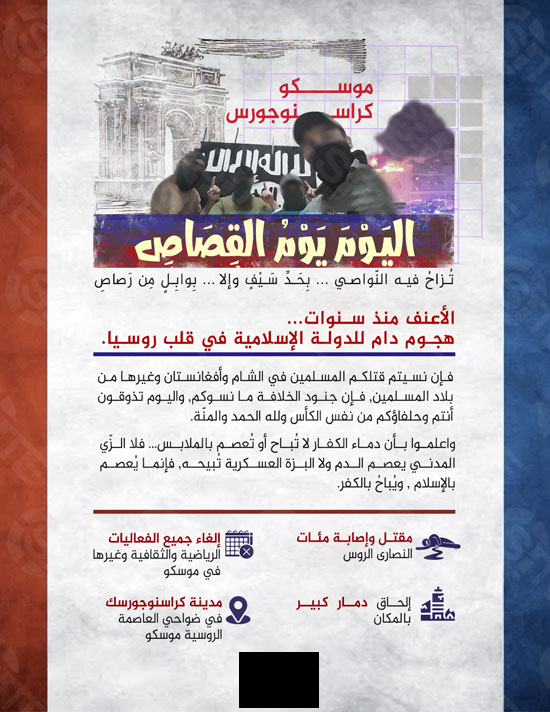
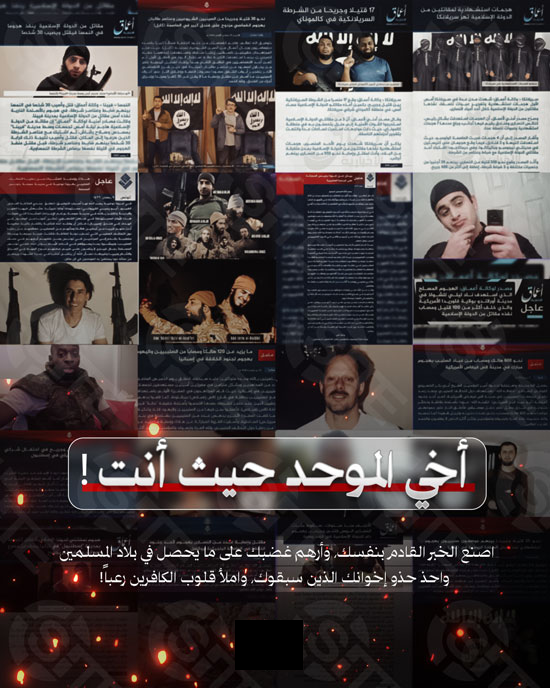
Posters created for the “Moscow Invasion” celebration campaign
These threats and declarations take on new weight in the wake of ISIS’ mounting high-profile attacks thus far in 2024. It was only three months before the Crocus City Hall attack that ISIS pulled off its January bombings in Iran. Both were by far the largest operations of their kind that the group has claimed in years.
Meanwhile, ISIS-inspired “lone wolf” attacks are also on the rise amid global outrage over Israel’s ongoing offensive in Gaza, as I’ve recently written. These lone wolf attacks feed on momentum and precedent, which the Crocus City Hall attack is sure to further inject into the community. This environment creates an increased terrorist threat throughout Europe, which France has already acknowledged by elevating its national security alert system to its highest level just months ahead of the Paris 2024 Olympics.
It’s also worth mentioning that the Crocus City Hall attack comes during Ramadan, an Islamic holy month jihadist groups exploit by promising increased spiritual rewards for carrying out terrorist attacks. The holy month doesn’t always see increases in attacks, but ISIS will no doubt seek to frame this latest attack as such an act in the hopes of inspiring more in the near term.
So long as ISIS-K operates this effectively in Central Asia, it is likely to pull off similar attacks in the future. This is a major problem not just for Central Asia and its neighbors, but for a global community subject to the violence any thriving ISIS “province” inspires.

Rita Katz
Executive Director & Founder
Rita Katz is the Executive Director and founder of the SITE Intelligence Group, the world’s leading non-governmental counterterrorism organization specializing in tracking and analyzing online activity of the global extremist community. She has authored two acclaimed books on terrorism: Saints and Soldiers (Columbia University Press, 2022) and Terrorist Hunter (Harper Collins, 2003)






